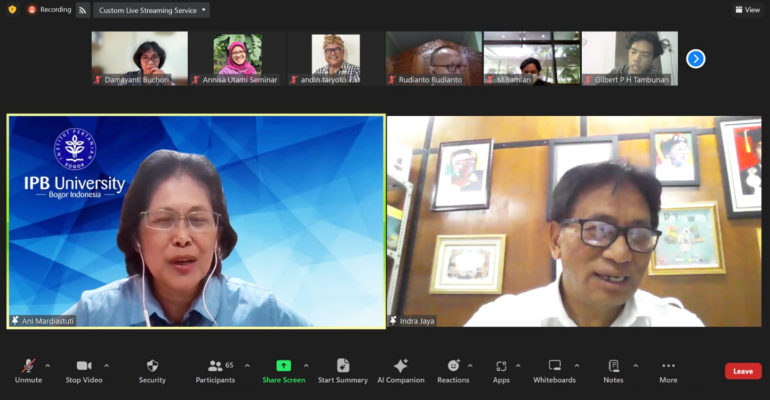CTSS IPB University Presents Experts to Discuss Ocean Dynamics in Indonesian Islands for Energy Security and Prosperity

Centre for Transdisciplinary and Sustainability Sciences (CTSS) IPB University held another Transdisciplinary Tea Talk, on 15/1. The discussion series this time discussed about “Ocean Dynamics in Indonesian Islands for Energy Security and Prosperity”.
Chief of CTSS IPB University, Prof Damayanti Buchori, said that the Transdisciplinary Tea Talk series at the beginning of 2024 was focused on water issues and this was related to the World Water Forum which would be held in Bali.
“We already know that one of the big issues related to climate change is indeed water. Both access to water and catastrophic events such as rainstorms, floods, including in coastal areas where there is an increase in sea levels,” said Prof Damayanti.
Prof Damayanti continued, coastal and ocean issues are very important to discuss considering Indonesia is an archipelago. “Therefore, we want to contribute to increasing understanding of these water issues,” she said.
Prof Indra Jaya, an expert in Underwater Acoustics and Marine Instrumentation at IPB University explained that the sea in Indonesia is connected between one sea and another, between one ocean and another. Therefore, the existence of the sea is global and cannot be separated from our lives.
“We know that in the sea there is a phenomenon called tides, this phenomenon can later be used as a source of energy,” said Prof Indra Jaya, lecturer at the Faculty of Fisheries and Marine Science, IPB University.
Prof Indra explained that spatially, the sea surface is hot and cold, so it is called spatiotemporal. This phenomenon will result in different air pressures that trigger winds and ocean waves and currents. These waves and currents can also be used as a source of renewable energy.
“In accordance with the landscape and dynamics of the Indonesian Archipelago, ocean energy can be utilised in shallow waters in the form of tidal energy and in the sea in the form of Ocean Thermal Energy Conversion (OTEC),” said Prof Indra.
Prof Indra Jaya added that investment in research and development, policy and regulatory readiness and human resources are needed. This is needed by considering the development of the level of readiness of ocean energy technology which is not yet fully at the commercial level and the various challenges that exist.
“The presence or availability of ocean energy not only increases energy security, but has the potential to generate economic activity and improve the welfare of island communities,” said Prof Indra. (*/Lp) (IAAS/RUM)



